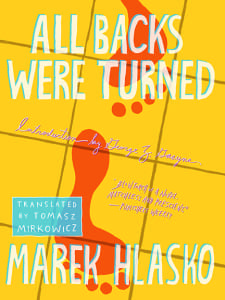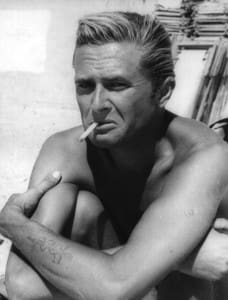 The following is an adaptation of the Introduction by George Z. Gasyna to All Backs Were Turned, the novel by Marek Hlasko that New Vessel Press published two weeks ago. Gasyna is Associate Professor of Slavic Languages and Literatures at the University of Illinois. He has written extensively on 20th century Polish literature, exile and immigration, and Jewish-Polish relations. He is currently writing a book about modern Polish borderland literature.
The following is an adaptation of the Introduction by George Z. Gasyna to All Backs Were Turned, the novel by Marek Hlasko that New Vessel Press published two weeks ago. Gasyna is Associate Professor of Slavic Languages and Literatures at the University of Illinois. He has written extensively on 20th century Polish literature, exile and immigration, and Jewish-Polish relations. He is currently writing a book about modern Polish borderland literature.
The inscription on the grave at Warsaw’s Old Powazki Cemetery reads, “His life was short, and all backs were turned.” Indeed, Hlasko was just 35 when he died – though years of eking out a marginal existence, frequently underemployed or resorting to what Poles of that generation called “black work,” and a penchant for running afoul of the law, all conspired to make him look like he was in his fifties.
By most accounts (of those who knew and cared for him, at least), the final two or three years of Hlasko’s life were a period of intense burnout, the tail end of a spectacular career that had launched him, at mere twenty, as the foremost voice of his generation—a deeply troubled generation, traumatized by the horrors of Nazi occupation, the Holocaust, and the violent Soviet-backed communist takeover of Poland that followed—and simultaneously its chief iconoclast.
By other accounts, however, Hlasko in 1969, the year of his death, was about to enter a new stage in life. Having led a peripatetic existence throughout the previous decade, shuffling between various safe havens in Western Europe, Israel, and the United States—his native Poland declared Hlasko persona non grata in 1958, following the illicit publication of one of his novels by an émigré press, while he himself was in France on a state-funded fellowship—Hlasko was seriously considering settling down somewhere on the American West Coast, ideally the LA basin. When asked why there, of all places in the world, and in light of his halting English and a relative lack of contacts in the area, Polish or otherwise, his response was simple: “LA has good weather. I like good weather.”
Was his sudden death on June 14 while staying at the home of his West German publisher, of an overdose of sleeping pills, a deliberate act, as the popular press insisted, the last spasm of stubborn contrariness on the part of socialist Poland’s original bad boy, variously hailed as an Iron Curtain counterpoint to James Dean and as a communist Angry Young Man? Was it a consequence of ongoing disappointment and heartbreak? Or a merely banal though tragic miscalculation, exacerbated by immoderate alcohol use? We will probably never know with certainty. And perhaps it does not matter. Fellow author and adventurer Jerzy Kosinski, another of communist Poland’s very bad boys and a fellow exile ultimately to the US—though his eventual suicide, in 1991, was by all accounts planned—possibly settled the matter when he declared that Hlasko “personally lived through what he wrote and died of an overdose of solitude and not enough love.”
 Hlasko began writing fiction while still in high school, and was publicly recognized early and often. He had movie star good looks, a roguish smile, and an ideologically “correct” past, having refashioned himself as an orphaned child of simple laborers, a housemaid and a fireman, when his father had in fact been a prominent attorney in interwar Poland. Hlasko said the right thing frequently enough when called upon and talked his way into the front offices of the premier state-run youth-oriented literary magazine, Po prostu [“The Way It Is”]. He was being groomed for his tenure as a shining star of Poland’s new socialist culture. Hlasko was to be the poet of the transport truck and the proletarian suburb, a writer of youth and possibility – within Party-approved boundaries, of course. This was a role he initially assumed with enthusiasm, and it paid big dividends for a time, in the shape of fellowships, interviews, cash awards, vacations at writers’ colonies on the state’s dime, and the like.
Hlasko began writing fiction while still in high school, and was publicly recognized early and often. He had movie star good looks, a roguish smile, and an ideologically “correct” past, having refashioned himself as an orphaned child of simple laborers, a housemaid and a fireman, when his father had in fact been a prominent attorney in interwar Poland. Hlasko said the right thing frequently enough when called upon and talked his way into the front offices of the premier state-run youth-oriented literary magazine, Po prostu [“The Way It Is”]. He was being groomed for his tenure as a shining star of Poland’s new socialist culture. Hlasko was to be the poet of the transport truck and the proletarian suburb, a writer of youth and possibility – within Party-approved boundaries, of course. This was a role he initially assumed with enthusiasm, and it paid big dividends for a time, in the shape of fellowships, interviews, cash awards, vacations at writers’ colonies on the state’s dime, and the like.
Hlasko’s rise was meteoric; he became a legend in his own time, a paradoxical socialist brand. Yet he was hardly the slightly disparaging painter of everyday life of Marxist utopias-in-progress, as many critics maintained (at least in their public discourse). Rather, in a true Conradian idiom he sought to “make you see,” to partake in his own vision. And as the years passed, this vision diverged further and further away from the constraining dogmas of approved, formulaic “production novels”—novels that focused, literally, on “production” in farms and factories—towards dramas of power, lust, and revenge, dramas enacted between and among fallen men – men who are in turn elevated to the status of archetypes, symbols even.
In fact, the socialist heroes of even his early stories and novels, such as The Eighth Day of the Week, are no wise triumphant New Men with a flaw or two. Instead, they are broken subjects, unsteadily seeking their way within an inhuman system, sometimes improvising, frequently resorting to manipulations and lies as they seek to improve on impossible odds. Already in 1956, at the peak of his Polish fame, Hlasko stated that his narratives, chock-full of brutality and heartbreak though they were, simply reflected reality as he knew it, that his protagonists were looking in vain for love and fulfillment in a city that never smiles. (Post-war, derelict Warsaw was the setting here, though any number of Polish cities and towns would have fit that bill.) Indeed it was socialist realism, that bastard genre of happy tomorrows pledged but never delivered on—since infiltrators, saboteurs, and eternal enemies lurked always and everywhere and had to be eliminated first—which presented the cynic’s vision of life. The protagonist of The Eighth Day of the Week, an underemployed writer named Grzegorz, wrestles with the contradiction between what has been promised him of the brave new world and what has been borne out. In the end, he asks, “Can anything valuable come out of a world that has to use blackmail to keep from collapsing?” The indirect answer to his question, which he himself provides, is, “Waiter, half a liter, please.”
From 1959 until his death, Hlasko led a life of exile: his petitions to return home to Poland were ignored or rejected by the regime in Warsaw, and so he roamed around Western Europe and Israel. Soon, what had begun as youthful wanderings began to resemble an existential imperative. By consensus, Hlasko’s most intensely productive phase is the period between 1959-64, though even then, as an avowed “outsider,” he shuffled between West Germany and Israel.
The texts either dating from or inspired by this chapter in his life, such as the short novel Killing the Second Dog (Drugie zabicie psa, available in English also from New Vessel Press), are unusually sparse, claustrophobic, oversaturated by color and light, and punctuated by images of surprising beauty which serve as a vivid counterpoint to the stark portrayals of brutality and humiliation endured by the down-and-out antiheroes. This semi-autobiographic world is a zone dominated by men, men who are often paired in their peregrinations so as to both complement and expose one another’s weak sides. In fact, all the protagonists of Hlasko’s oeuvre suffer from major handicaps. At the opening of the novel, co-protagonist Dov Ben Dov, a former Israeli Army officer who has fallen on hard times, is on trial yet again, this time for assault in a Tel Aviv club. When the presiding judge asks him for his name and demands that he answer whether he will plead guilty to the charges of “disrupting public order in the city of Tel Aviv on June fifth,” Dov fires right back: “No. As far as I remember, there’s never been any order in this city.” Conflict is in the very bones of Hlasko’s protagonists, and of his plots, and there are never any easy answers.
Expansive and self-congratulatory male bravado fills the entire canvas, but it becomes clear soon enough that the root cause of Dov’s misfortunes, present and future—apart from his cantankerous, narcissistic father perhaps—is his spectacularly failed marriage. All the other men in the novel, whether friends, enemies, or mere bystanders, concur on this point. “She brought him down” is the laconic assessment of one of the peripheral men in the story, as he sits in a restaurant where he’s just met with Dov. “She did,” a passing waiter nods in fatalistic agreement.
As noted above, Hlasko’s novels and shorter fiction, especially those produced in the late ’50s and early ’60s, are organized around two male protagonists who share the spotlight. We often encounter the two principals while they are already on the road, in the midst of a longed-for escape from their problems, which sometimes involves their participating in some elaborate swindle or dealing with similar reversals of fortune fate has thrown their way. And while they despise significant elements of each other’s personalities, they desperately need one another – much the same way as Beckett’s characters in Endgame or Waiting for Godot depend on one another’s presence even as they abhor it. The idea of setting out on the road with a companion constitutes a time-honored literary paradigm in the Western canon. Hlasko borrows liberally from the picaresque convention, but further sharpens his encounters “between men” through the cinematic twist of extreme close-ups, abrupt perspectival changes, and the deployment of recurrent objects that may foreshadow dramatic action. In All Backs Were Turned, for instance, stones play such a symbolic function, evoking—among other images—Christ’s parable on the doubtful virtue of guiltlessness and, more obliquely, the Genesis account of the contest between Cain and Abel.
The protagonists engage in pithy sarcasm and constant one-upmanship – but the situation can also turn on a dime. The stakes are deadly serious, the categories of survival starkly elemental, leaving precious little room for maneuver. And justice, here on the frontier, ends up as a cruel handmaid of forces that our protagonists, preoccupied with scraping a living, with capturing happiness if only for a fleeting moment—and thus human, all too human, tragically human—are simply unable to grasp. Wrapped up in their fragile egos, engrossed in their dramas, their backs turned, they never see that stone coming.
George Z. Gasyna
Associate Professor, University of Illinois at Urbana-Champaign